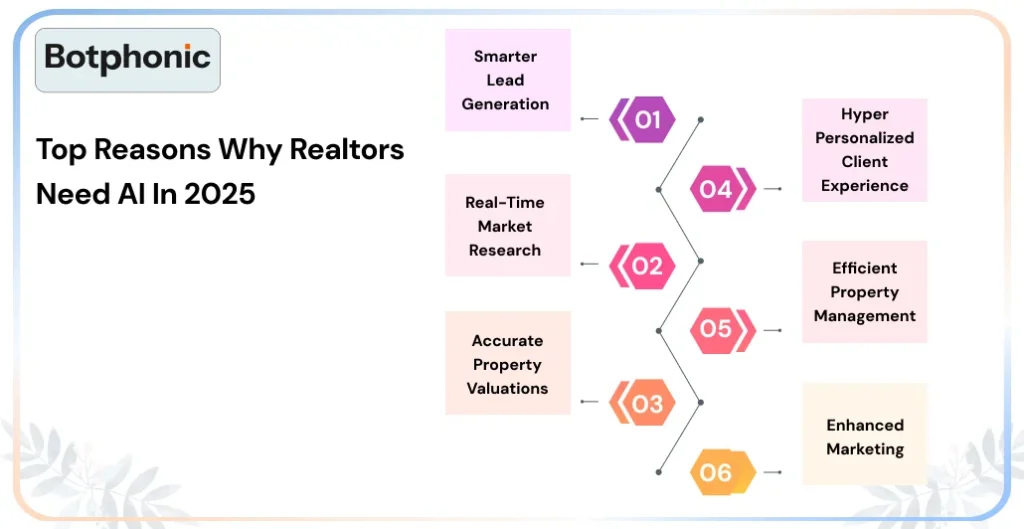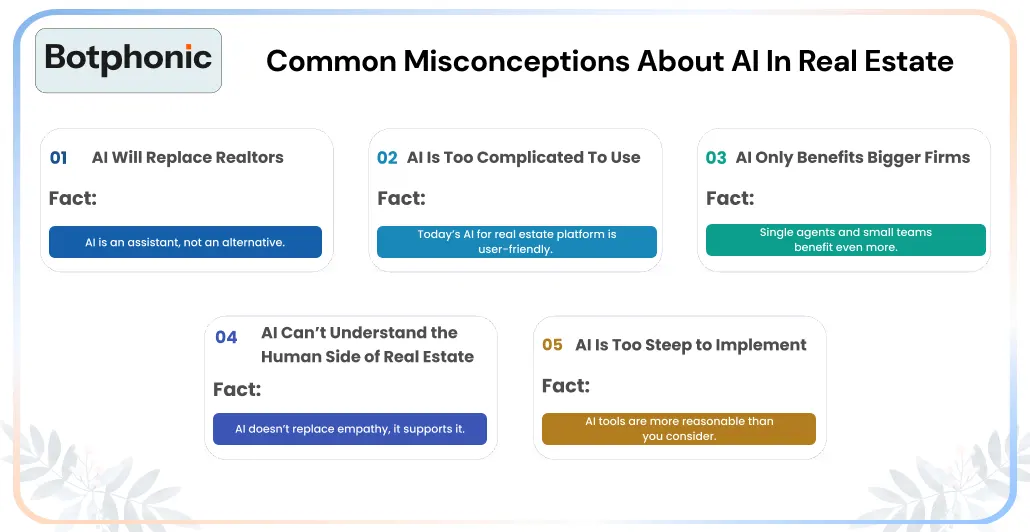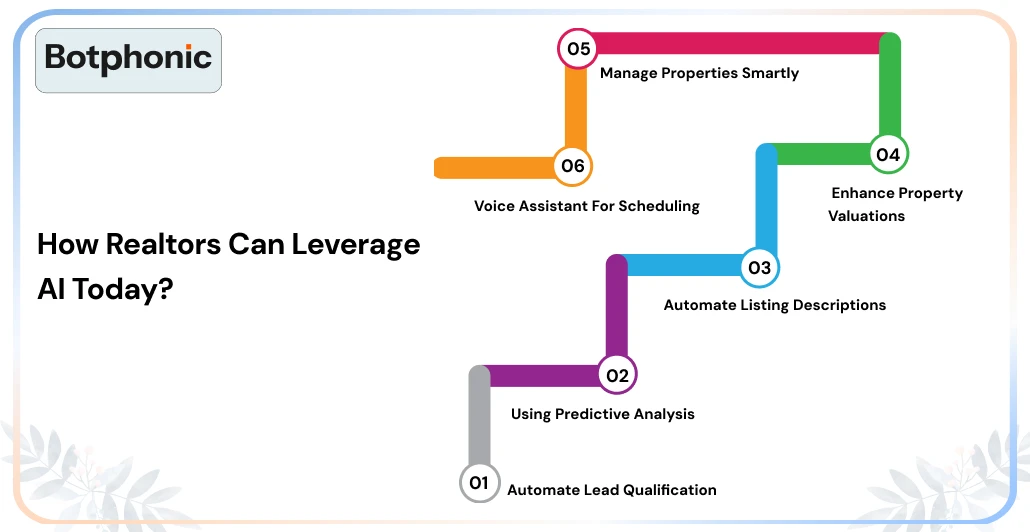
Summarize Content With:
Quick Summary
In this post, we are going to read about how AI is revolutionizing the real estate world and why realtors need AI in 2025. We are also going to see how AI and real estate are benefiting in not just one but in numerous ways. We will be learning about how to incorporate AI as a real estate agent and how it has been optimized to this day in this industry.
Introduction
Looking for a client to sell a property, but not able to find one? Whenever there’s a new buyer interested in property, you get tired of finding a suitable one for them and asking them the same questions again and again to get a proper idea of their desired property. Don’t worry, today we are going to share some details that you’ll find useful for your whole life. We are going to let you know about how AI and AI Virtual Assistants have become a necessity in real estate; Moreover, it’s not just a tool anymore, but a well-trained agent who will help you in your tasks and increase your efficiency like no one else.
What does AI mean in Real Estate?
In real estate, AI is known as an outcome of applied artificial intelligence solutions to several aspects of the industry. For instance, property valuation, property management, and even customer experience. Moreover, it involves optimizing AI algorithms and machine learning to program the tasks in a certain way without adding any manual effort.
Additionally, using AI helps effectively analyze data and even provide valuable insights to improve decision-making.
Top Reasons Why Realtors Need AI in 2025

The real estate industry is no longer ruled by just humans; AI has made its entry. Also, with its effectiveness and popularity, it’s getting the recognition that it deserves.
Here are the top reasons why realtors need AI in this new generation of tech lovers:
1. Smarter Lead Generation
Traditional lead generation has always been time-consuming, and it might even be irritating. AI real estate assistants and voice bots for real estate have been getting effectively optimized. In addition to this, using machine learning to detect high-intent prospects and to automate follow-ups. It allows human representatives to focus on closing deals, not chasing them.
2. Real-Time Market Research
Leveraging AI tools allows agents to analyze the pricing trends and neighborhood data. Moreover, it also helps predict buyers’ preferences for sharing data accordingly. AI real estate market research also enables representatives to provide accurate valuations, spot investment opportunities. It lets them deliver up-to-date insights to the clients.
3. Accurate Property Valuations
AI algorithms assist in improving property valuation accuracy. Even with AI, real estate finance
modeling and historical trend analysis, it helps predict valuation. Incorporating these models reduces the chances of human error and improves investment decisions.
4. Hyper-Personalized Client Experience
Integrating AI, realtors will help you provide tailored recommendations and will schedule tours automatically. In fact, AI also helps to respond to clients instantly, whether it’s outside business hours or even if it’s a holiday.
5. Efficient Property Management
AI allows effective streamlining of tasks in hand. It helps from screening tenant applicants and collecting rents to maintenance requests made by clients. For agents managing several properties at once, AI real estate management tools can effectively help reduce workload.
6. Enhanced Marketing
AI tools create well-strategic and optimized ad campaigns, schedule posts, and even identify the right pattern and time to post. When users are mostly active and posts are reaching potential customers. Using AI in real estate marketing ensures effective listing while sharing optimal effort.
The benefits of AI in real estate are far-reaching; it can help preserve time while delivering better client results. In 2025, adopting AI isn’t about innovation, but it’s a survival strategy in this new era of a tech-savvy world.
Common Misconceptions About AI in Real Estate

While the use of AI in real estate is increasing, there are still a few realtors who are uncertain about using it. There are many misconceptions regarding the usage of AI in real estate. While there are misunderstandings, it will get clear today, and you will know how AI is helping, not piling up your work.
1. AI Will Replace Realtors
Fact: AI is an assistant, not an alternative.
You are overthinking and having thoughts of getting replaced by AI? Don’t worry, it won’t happen. AI real estate assistants will handle those repetitive tasks and free your agents for important tasks rather than just doing follow-ups.
2. AI Is Too Complicated To Use
Fact: Today’s AI for real estate platform is user-friendly.
From easy CRM integrations to adding AI call assistant, these AI solutions have become as simple as doing plus, minus for a college graduate. Moreover, it has become easier to access and understand that you don’t need any technical knowledge.
3. AI Only Benefits Bigger Firms
Fact: Single agents and small teams benefit even more.
AI helps smaller firms to level the field by sharing access to advanced tools, which were traditionally used by bigger agencies. Such as, AI can help automate listing descriptions, and even help generate property reports.
4. AI Can’t Understand the Human Side of Real Estate
Fact: AI doesn’t replace empathy, it supports it.
Implementing AI in real estate doesn’t remove the uniqueness of a humanized touch; it just enhances it. Analyzing buyer behavior, preferences, and even communication patterns has become easy to understand. In addition to this, it helps to know clients on a better scale and serve them better.
5. AI Is Too Steep to Implement
Fact: AI tools are more reasonable than you consider.
Using subscription-based models and optimal pricing models, AI-powered platforms have become accessible to every firm. The ROI from time saved and increased efficiency helps improve client satisfaction; Additionally, it often outweighs the initially invested cost.
Understanding these misconceptions helps realtors know why they need AI and how it’s more useful to them now than ever. It’s not about replacing but increasing efficiency by using these tools effectively.
How Realtors Can Leverage AI Today?

To leverage AI in real estate, there’s no longer a need for a tech background or even a big budget. In fact, there are not one but several tools, which are especially designed for realtors in mind. Moreover by offering efficient marketing and lead qualification can be seen by utilising these tools.
Let’s see how you can leverage AI right now and evolve your business astonishingly.
1. Automate Lead Qualification
Using AI for a real estate assistant can help instantly qualify leads and schedule showings. In addition to these, AI assistants also answer FAQs instantly, providing support 24/7.
2. Using Predictive Analysis
Analyzing buyer behavior, previous sales, and even market trends has become easier with AI platforms. Moreover, it also assists with targeting the right clients at the right time, and takes help from these AI tools.
3. Automate Listing Descriptions
Generate listing descriptions, email newsletters, and social media content with the help of AI-powered writing. Furthermore, using AI content creation tools can save hours of writing time and ensure proper consistency of brand tone.
4. Enhance Property Valuations
AI tools are offering smart pricing solutions and comparable sales. Moreover, it also helps in monitoring local demand and seasonality. By utilizing tools, sellers can help price their property and reduce time on the market too.
5. Manage Properties Smartly
Streamline tenant communication and automate rent collection easily with AI real estate management tools. Besides offering these miraculous benefits, it will also help flag maintenance needs.
6. Voice Assistant for Scheduling
Integrating tools, such as voice bots and smart assistants, can manage calendar invites and even respond to potential leads. It will help you with hands-free productivity and enhance client satisfaction with quicker response time.
With increasing competition, many realtors have inclined themselves towards using the right tools. Even a solo agent helps companies like a full team, which makes their future secure and gives them an edge over their competitors.
Tips for Successful AI Adoption in Real Estate
In addition to adopting these effective tools is not only helpful but also groundbreaking. Importantly, it will only be effective if it’s done smartly and strategically. For realtors who are looking for the right approach to integrate these tools into their business, here are some tips that will help them do them better.
1. Identify Your Pain Points
Just selecting tools and not knowing even your own pain points can affect you negatively. Before adding any tool, figure out where it’s going to help you most:
- Is it follow-ups that are overwhelming you?
- Adding listings has become too time-consuming.
Start with one or two obvious use cases where AI is going to help you.
2. Choose User-Friendly Tools
Even though there are numerous AI tools, recognize the ones that are going to be useful for you and are problem-specific. Ensure that it’s tailored to your industry so you achieve the desired results. Look for qualities, like:
- Automated listings
- Lead scoring
- Voice bot for real estate(specifically)
3. Scale Gradually
Start with one tool automation, that’s going to make it easier, like a chatbot or AI-powered email marketing. Also, ensure to test it once you see visible ROI, and scale to other areas too.
4. Train Your Team
Productive AI adoption depends on people, not solely on software. Importantly, ensure to:
- Offer short training sessions to your existing employees.
- Inform your clients about their interaction with virtual AI.
- Escalate the path to a human agent when required.
5. Monitor ROI
Don’t forget to track essential metrics, such as:
- Generated leads
- Saved time
- Improved response rate
- Closed deals
Make adjustments relevant to metrics and performance.
6. Stay Updated and Experiment
The futurity of AI is growing rapidly in the real estate sector. Before making a strategy, educate yourself with industry newsletters, industry webinars, and explore new tools relevant to your industry.
The key to booming AI adoption is not just its intricacy but clarity. When you understand this, you will acknowledge its importance and how it supports your business.
Conclusion
Simply, to answer why realtors need AI is to scale and make their work easier. Undoubtedly, AI tools are here to increase productivity and reduce the burden on human agents. Automating listings and follow-up calls lets realtors focus on potential clients and closing the deal. It should be noted that they are no longer invested in just scheduling visits and asking for the documentation process on the call.
AI has made it easier and also enhanced the monitoring of market trends. Integrating an AI virtual assistant is no longer a show-off but a necessity to upgrade your sales and scale smartly. Ensure to update your AI tools and grow along with our business.

